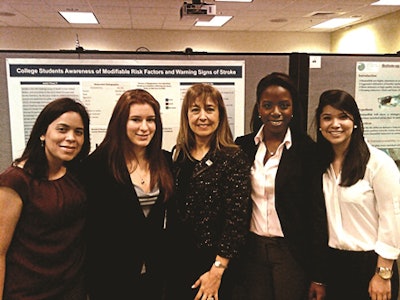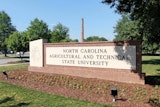 Dr. Irma Becerra-Fernandez, center, said the inaugural Life Sciences South Florida STEM Research Symposium for students was a hit.
Dr. Irma Becerra-Fernandez, center, said the inaugural Life Sciences South Florida STEM Research Symposium for students was a hit.Dr. Irma Becerra-Fernandez knew in eighth grade that she had a knack for mechanical engineering after taking an aptitude test at her high school in Puerto Rico, but she had no interest in the profession since her teacher couldn’t explain the field. Becerra-Fernandez didn’t give engineering a second thought until she took an electrical engineering course at the University of Miami, causing her to switch her major from math to engineering.
Becerra-Fernandez went on to earn her undergraduate and master’s from the University of Miami and a Ph.D. in engineering from Florida International University, where she rose through the ranks from a visiting professor to vice president of engagement. Though Becerra-Fernandez focused on mathematics, one experience in her early years motivated her to take the school’s STEM program in a different direction.
“I didn’t know what a resistor was, and the boys made fun of me for it,” she says. “I started with a disadvantage. I had shortcomings because I had never played with these things as a kid.”
Under the leadership of FIU President Mark Rosenberg, Becerra-Fernandez is changing that lack of exposure to resources for underrepresented minorities through a number of initiatives, including the Life Sciences South Florida initiative, which strives to foster innovation by supporting nascent science, biotechnology and pharmaceutical industries; create programs to increase STEM student and work force development; and recruit and retain talent in the South Florida region. There is also a partnership between FIU and Miami-Dade Public Schools, known as The Education Effect, which prepares high school students for college.
“What inspired [Dr. Rosenberg]—and, of course, I ascribe to the same ideals—is to prepare a more diverse work force,” Becerra-Fernandez explains. “We have moved beyond the formative stage, and our contributions are starting to make an impact.”
FIU has doubled its dual-enrollment numbers through The Education Effect with Miami Northwestern, a predominantly Black and Hispanic high school in the area. Students can take college courses for college credit and are able to visit FIU for academic enrichment. With a $1 million grant from the JP Morgan Foundation, Miami Northwestern will be getting an aquaponics lab and an organic garden. The aquaponics lab, a space dedicated to cultivating plants and nurturing aquatic animals in a recirculating environment, will be the first in Miami-Dade County.
“In the past, students have come unprepared for freshman year,” says Becerra-Fernandez. “Well, now we’re offering training. We’ve created a partnership that has really transformed the school.”
Ebony Edmonson, Miami Northwestern’s assistant principal, says her school has benefited from its partnership with FIU. Approximately 40 10th-graders have been involved with the College of Education’s Algebra Project, the university’s computer science students do presentations for the high school’s robotics club members, and the student body is being exposed to possible careers in organic farming and other STEM industries.
“The partnership has raised the conversation of college at Miami Northwestern,” Edmonson says. Graduation rates at the high school have increased from 54 percent to 76 percent, and the number of students earning a GPA of at least a 3.0 has jumped by 50 percent.
“We have been able to measure improvements at all levels—high-scoring students and low-scoring students have improved their math and verbal scores,” says Becerra-Fernandez. “We are looking to replicate this work in other communities.”
FIU is also working with Miami-Dade County Public Schools to recruit and prepare 200 local STEM teachers in 26 low-performing schools through an initiative called Teach STEM Miami.
“Mathematics and science is the type of learning that you have to build on prior knowledge. It’s not memorization based,” explains Becerra-Fernandez. “In fields like these, you have to have excellent teachers every step of the way.”
Fostering job growth
Launched in 2010, LSSF attempts to solve the age-old question of how to produce more minority STEM graduates. FIU is working with 16 educational, economic development and research institutions through LSSF to encourage job growth in STEM. The institutions and organizations involved in the coalition include Florida Atlantic University, the University of Miami, Florida Atlantic Research Park and the Greater Fort Lauderdale Alliance. As part of this initiative, a research portal has been created to allow STEM academicians to share resources. This portal has allowed faculty and students from all of the institutions to rent equipment in the area.
“Universities don’t have a history of being collaborative with each other. As a matter of fact, we tend to compete with each other,” says Becerra-Fernandez.
While Silicon Valley, Washington, D.C., and several cities across the U.S. have strong STEM research corridors, South Florida has lagged in these endeavors. FIU is the number-one producer of Hispanic STEM graduates and number eight for African-American STEM graduates nationally, yet many of its graduates leave the region, which was a strong impetus for the collaborative aspect of LSSF.
“If we don’t have enough opportunities for our students to be hired upon graduation, then we are not serving our community,” Becerra-Fernandez says. “These jobs are really important because they are top-paying jobs. They are the ones that are least likely to be the subject of cuts. STEM jobs are critical.”
Active learning
In April, 62 students from eight colleges and universities gathered at Miami Dade College as part of LSSF’s aim to foster interconnectedness for the LSSF STEM Research Symposium, which allowed them to showcase their research. Ruslan Garcia, an FIU graduate who will be starting medical school at the University of Miami in the fall, was awarded an iPad for winning the competition, but he says the experience gave her much more.
“I was able to get good feedback on my project, some of which I incorporated into my thesis later that semester,” says the aspiring physician-scientist who presented his work on the angiogenic effect of Endothelin 3 on melanoma tumors. “I was also able to practice presenting scientific results to all types of individuals. … As a researcher, one of the most essential traits is the ability to communicate well with others—this is especially beneficial when applying for grants and such.”
Becerra-Fernandez says the inaugural student conference was a hit, and LSSF plans to host it every year.
“Never before had these students had the opportunity to meet their peers from other institutions in the area to showcase their work,” she says. “Sometimes we need to push ourselves in areas we feel uncomfortable.”
Pedagogical transformation via service-based coursework has also been a key element of LSSF. Promoting more internship opportunities in the area is critical to preparing a diverse work force, notes Becerra-Fernandez.
Becerra-Fernandez is focused on growing the LSSF initiative. So far, St. Thomas University, the Torrey Pines Institute for Molecular Students and Barry University have expressed interest in joining LSSF. Overall, it’s about building up the community around the university.
“Oftentimes, you find universities that are not really responsive to their communities,” she says. “We have to make sure that we don’t leave a segment of the population out of what is going to be the most important source of high-paying jobs in the future.”















